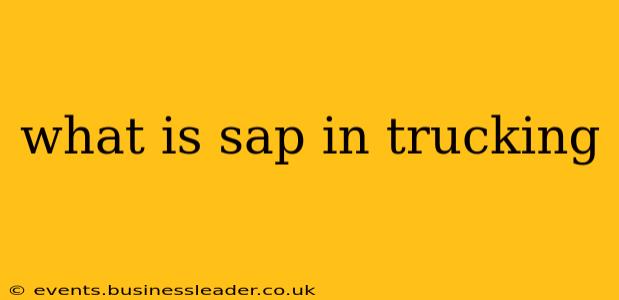The trucking industry, a cornerstone of global commerce, faces constant pressure to optimize efficiency, reduce costs, and enhance customer satisfaction. This is where SAP (Systems, Applications & Products in Data Processing) software steps in, offering a comprehensive suite of solutions designed to streamline various aspects of trucking operations. But what exactly is SAP in trucking, and how does it benefit trucking companies of all sizes?
This article dives deep into the role of SAP in the trucking industry, exploring its applications and benefits. We'll address common questions surrounding SAP's use in logistics and transportation management.
What are the different ways trucking companies use SAP?
SAP offers a modular system, meaning trucking companies can choose specific modules to address their unique needs. Some common applications include:
-
Transportation Management (TM): This module is crucial for optimizing transportation planning, execution, and monitoring. It helps manage freight shipments, track vehicles, optimize routes, and handle carrier selection and communication. It's all about getting the right goods to the right place at the right time, as efficiently as possible.
-
Supply Chain Management (SCM): This broader module integrates various aspects of the supply chain, from procurement to delivery. In trucking, this means connecting with suppliers, managing inventory, and coordinating deliveries with other parts of the supply chain. This creates a more holistic view of the entire logistical process.
-
Enterprise Resource Planning (ERP): This is a more comprehensive system that integrates various business processes, including finance, human resources, and manufacturing. For trucking companies, ERP helps manage financials, track driver hours, and manage maintenance schedules. It’s the central nervous system of the business.
-
Customer Relationship Management (CRM): While not directly related to the physical movement of goods, CRM helps manage relationships with customers, track shipments, and provide excellent customer service. Happy customers mean repeat business.
What are the benefits of using SAP in the trucking industry?
Implementing SAP software offers numerous advantages for trucking companies:
-
Improved Efficiency: Automation of processes like route planning, dispatch, and billing leads to significant time and cost savings.
-
Enhanced Visibility: Real-time tracking of shipments and vehicles improves transparency and allows for proactive issue resolution.
-
Reduced Costs: Optimized routes, efficient resource allocation, and reduced paperwork lead to lower operating costs.
-
Better Decision-Making: Access to real-time data and advanced analytics empowers better strategic decision-making.
-
Improved Customer Satisfaction: On-time delivery, accurate tracking information, and responsive customer service enhance customer satisfaction.
Is SAP expensive for trucking companies?
The cost of implementing SAP can vary significantly based on the size of the company, the modules chosen, and the level of customization required. While the initial investment can be substantial, the long-term benefits often outweigh the costs through increased efficiency and reduced operating expenses. It's vital to carefully assess your needs and budget before committing to an SAP implementation.
How long does it take to implement SAP in a trucking company?
The implementation timeline varies depending on factors such as the company's size, the complexity of its operations, and the scope of the project. It can range from several months to over a year. Thorough planning and a dedicated project team are crucial for a successful and timely implementation.
What are some alternatives to SAP for trucking companies?
While SAP is a leading provider of enterprise software, several other transportation management systems (TMS) exist, offering various features and functionalities. The best choice depends on the specific needs and budget of the trucking company. Researching alternative TMS solutions is essential before making a decision.
Conclusion
SAP software plays a significant role in modernizing the trucking industry. By streamlining operations, improving efficiency, and providing valuable insights, SAP solutions empower trucking companies to compete effectively in a demanding market. While the initial investment can be substantial, the long-term benefits often translate into significant cost savings and improved profitability. Choosing the right SAP modules and a thorough implementation plan are key to maximizing the return on investment.
